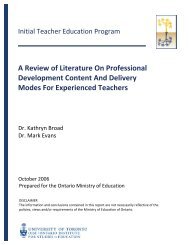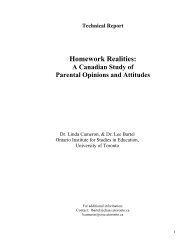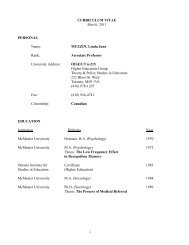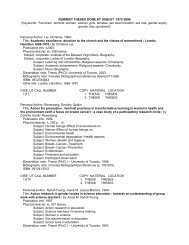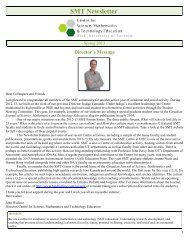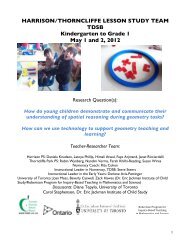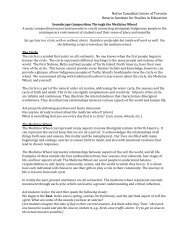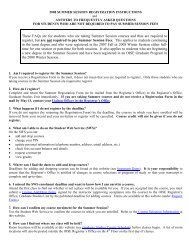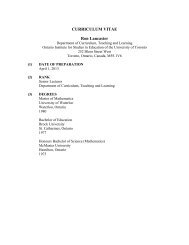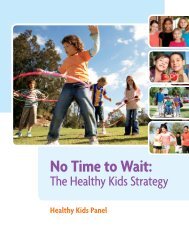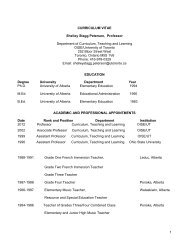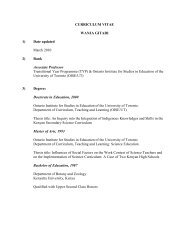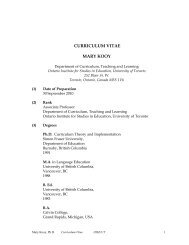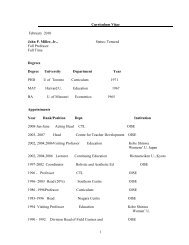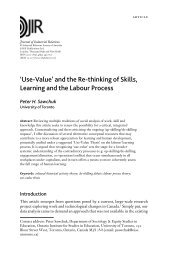The Ontario Curriculum, Grades 9-12 - Ministère de l'éducation ...
The Ontario Curriculum, Grades 9-12 - Ministère de l'éducation ...
The Ontario Curriculum, Grades 9-12 - Ministère de l'éducation ...
You also want an ePaper? Increase the reach of your titles
YUMPU automatically turns print PDFs into web optimized ePapers that Google loves.
E2.2 plan and conduct an inquiry in a microenvironment to treat a solid, liquid, or gaseous<br />
waste (e.g., reduce the acidity in a closed bog system in an aquarium; use a<br />
vermicomposter to recycle solid organic matter) [IP, PR]<br />
E2.3 use a research process to investigate the waste generated throughout the life cycle of a<br />
product (e.g., the waste associated with all the materials and energy that go into the<br />
<strong>de</strong>velopment and disposal of a computer or a running shoe) [IP, PR]<br />
E2.4 plan and conduct a waste audit within their school, and propose a plan of action for<br />
waste reduction based on their findings (e.g., review the school’s policy regarding<br />
paper and plastic recycling, monitor actual practices, and propose strategies to improve<br />
them) [IP, PR, AI, C]<br />
E2.5 investigate a local, regional, national, or global waste management practice (e.g., local<br />
practices such as recycling or charging for resi<strong>de</strong>ntial and/or commercial garbage bags;<br />
shipping garbage to landfill sites in another region; disposal of nuclear waste; dumping<br />
raw sewage into rivers, lakes, oceans), and communicate their findings [PR, C]<br />
E3. Un<strong>de</strong>rstanding Basic Concepts<br />
E3. <strong>de</strong>monstrate an un<strong>de</strong>rstanding of the nature and types of waste and strategies for<br />
its management<br />
E3.1 <strong>de</strong>scribe different categories of waste (e.g., bio<strong>de</strong>gradable, recyclable, toxic,<br />
organic, inorganic)<br />
E3.2 explain some current waste remediation practices used with substances or products that<br />
are not environmentally friendly (e.g., “Toxic Taxi” for pick-up of household hazardous<br />
waste; the recycling of plastic to make furniture and “lumber”)<br />
E3.3 <strong>de</strong>scribe the scientific principles involved in processing solid, liquid, and gaseous waste<br />
(e.g., combustion, <strong>de</strong>composition, pyrolysis)<br />
E3.4 explain common strategies and technologies used in the collection and storage of waste<br />
(e.g., strategies such as recycling, composting, dumping in landfill sites; technologies<br />
such as compacters, enzyme digesters, flocculation tanks)<br />
E3.5 explain how scientific knowledge and technological processes have been applied in the<br />
<strong>de</strong>velopment of environmentally sound waste management strategies (e.g., accelerated<br />
waste aeration, bioremediation)<br />
F. Conservation of Energy<br />
F1. Relating Science to Technology, Society, and the Environment<br />
F1. assess the impact on society and the environment of the use of various renewable and<br />
non-renewable energy sources, and propose a plan to reduce energy consumption<br />
F1.1 evaluate the impact on the environment of renewable and non-renewable energy sources,<br />
and propose an environmentally friendly solution to reduce non-renewable energy<br />
consumption (e.g., a plan for broa<strong>de</strong>r use of hybrid cars or solar panels) [AI, C]<br />
Sample issue: In some remote areas that are off the electrical grid, generators that run on<br />
fossil fuels are used to generate electricity. However, these <strong>de</strong>vices are inefficient, and<br />
they produce carbon dioxi<strong>de</strong>, which contributes to global warming, and noise pollution.<br />
Sample questions: What impact can hydroelectric dams and generating stations have on<br />
the local environment? What effects do coal mining and the use of coal-burning power<br />
Science 137



